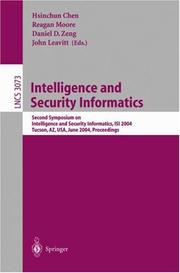
Intelligence and security informatics
By Hsinchun Chen
Subjects: Expert systems (computer science), Information Systems Applications, Information Systems, Congresses, Intelligentes Netz, Operating Systems, Securite nationale, Legal Aspects of Computing, Datensicherung, Congres, Exploration de donnees (Informatique), Computersicherheit, Securite informatique, Computers and Society, National security, Information Storage and Retrieval, Expert systems (Computer science), Exploration de donnees, Data mining, Systeme expert, Datenbankverwaltung, Computers, Terrorism, prevention, Information storage and retrieval systems, Computer science, Computers_xLaw and legislation, Data Mining, Operating systems (Computers), Management of Computing and Information Systems, Computer security, (incl. Internet), Monitoring, Systemes experts (Informatique), Innere Sicherheit, Kriminalpolitik
Description: Intelligence and Security Informatics: Second Symposium on Intelligence and Security Informatics, ISI 2004, Tucson, AZ, USA, June 10-11, 2004. Proceedings<br />Author: Hsinchun Chen, Reagan Moore, Daniel D. Zeng, John Leavitt<br /> Published by Springer Berlin Heidelberg<br /> ISBN: 978-3-540-22125-8<br /> DOI: 10.1007/b98042<br /><br />Table of Contents:<p></p><ul><li>Aligning Simulation Models of Smallpox Outbreaks </li><li>Data Analytics for Bioterrorism Surveillance </li><li>West Nile Virus and Botulism Portal: A Case Study in Infectious Disease Informatics </li><li>A Novel Policy and Information Flow Security Model for Active Network </li><li>A Novel Autonomous Trust Management Model for Mobile Agents </li><li>Privacy-Preserving Inter-database Operations </li><li>Finding Unusual Correlation Using Matrix Decompositions </li><li>Generating Concept Hierarchies from Text for Intelligence Analysis </li><li>Interactive Query Languages for Intelligence Tasks </li><li>Terrorism Knowledge Discovery Project: A Knowledge Discovery Approach to Addressing the Threats of Terrorism </li><li>The Architecture of the Cornell Knowledge Broker </li><li>Computer-Based Training for Deception Detection: What Users Want? </li><li>Identifying Multi-ID Users in Open Forums </li><li>Self-efficacy, Training Effectiveness, and Deception Detection: A Longitudinal Study of Lie Detection Training </li><li>Composite Role-Based Monitoring (CRBM) for Countering Insider Threats </li><li>Critical Infrastructure Integration Modeling and Simulation </li><li>Mining Normal and Intrusive Activity Patterns for Computer Intrusion Detection </li><li>The Optimal Deployment of Filters to Limit Forged Address Attacks in Communication Networks </li><li>A Tool for Internet Chatroom Surveillance </li><li>ChatTrack: Chat Room Topic Detection Using Classification</li></ul>
Comments
You must log in to leave comments.